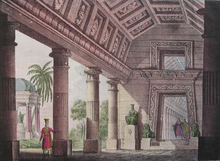Semiramide
[4] The ensemble-scenes (particularly the duos between Arsace and Semiramide) and choruses are of a high order, as is the orchestral writing, which makes full use of a large pit.
Musicologist Rodolfo Celletti sums up the importance of Semiramide by stating that it "was the last opera of the great Baroque tradition: the most beautiful, the most imaginative, possibly the most complete; but also, irremediably, the last.
During the years 1813 (when Rossini composed Tancredi) until 1822 he wrote a considerable series of them, mostly for the Teatro di San Carlo, Naples.
One reason for his new interest in the serious genre was his connection with the great dramatic soprano Isabella Colbran, who was first his mistress, then his wife.
[6] Following its premiere, the opera was given twenty-eight times[7] for the rest of the season in Venice (and, at some point, for four nights in a row)[8] and it went on to presentations throughout Italy and Europe, including Paris in 1825, Milan in 1829 and 1831, and Vienna in 1830.
However, it was chosen in 1880 to inaugurate the Teatro Costanzi, new venue of the Rome Opera company, and appeared as part of the Cincinnati Opera Festival 1882 which was attended by Oscar Wilde and which featured the famous diva Adelina Patti who chose the aria "Bel raggio lusinghiero" for her farewell performance.
It took until 1932 until the opera was again revived (in a German translation) in Rostock, and it then reappeared under Tullio Serafin at the 1940 Maggio Musicale Fiorentino.
Presentations at La Scala in Milan in December 1962 with Joan Sutherland and Giulietta Simionato required the re-assembly of the entire score from the Rossini autograph, since no other texts were known to exist.
[11] A major revival at the Aix-en-Provence Festival in 1980 was directed by Pier Luigi Pizzi and featured Montserrat Caballé in the title role with Marilyn Horne as Arsace.
Unlike many operatic overtures of the day, it borrowed musical ideas from the opera itself, thus making it unsuitable for use with another score.
The range and balance of musical ideas, from the hushed, rhythmic opening through the Andantino for four horns (drawn from the opera itself) and the repetition with pizzicato countermelodies in the strings to the lively allegro, make the overture to Semiramide one of Rossini's finest contributions to the genre and deservedly one of the most popular.
Arsace states his unwillingness to support Assur in his bid for the throne: (Scena and aria: Eccomi alfine in Babilonia... Ah!
Semiramide still believes that he really loves her, and vows that she will give him all he desires: (Duet: Serbami ognor sì fido il cor / "Always keep your heart this faithful to me").
When Semiramide names Arsace as her chosen one, Assur is outraged and Idreno accepts the decision but requests Azema's hand, which is granted.
All are horrified as King Nino's ghost appears, warning of the crimes to be expiated, telling Arsace that he will reign and to respect the High Priest's wisdom, and commanding him to come down into his tomb.
In turn, she threatens to reveal the crime, and they sing an extended duet: (Se la vita ancor t'è cara / "If you still hold life dear") recalling the terror and retribution that each could inflict upon the other if the truth came to light.
To reinforce this news, Oroe hands him a scroll, written by the King before his death, the reading of which confirms the Priest's statements.
[22] Almost collapsing in grief into Oroe's arms, he asks for comfort: (Aria: In sì barbara sciagura / "In such barbarious misfortune"), but the priests quickly reinforce his need to take immediate revenge.
They equip him with armour and a sword and give him the determination to proceed: (cabaletta: Si, vendicato, il genitore / "Yes, my father avenged").
Semiramide's apartments Azema and Mitrane are alone, the former complaining that she has lost everything now that Arsace, the love of her life, is due to marry the queen.
Azema promises him her hand if he so desires it, but he wishes that she would love him: (Aria: La speranza più soave / "The sweetest hope").
He swears filial loyalty, expressing the wish to spare his mother: (Duet: Ebben, a te, ferisci!
He moves towards the tomb only to find some unknown force, some apparition holding him back: (Chorus, scena and aria: Deh ti ferma ... Que' numi furenti, Quell'ombre frementi / "Oh, stop ... Those wrathful gods, those quivering shades").
In the confusion of the darkness, all three – Arsace, Semiramide, and Assur – express some bewilderment as to the loss of their courage at this crucial moment: (Trio: L'usato ardir / "My former valour").




